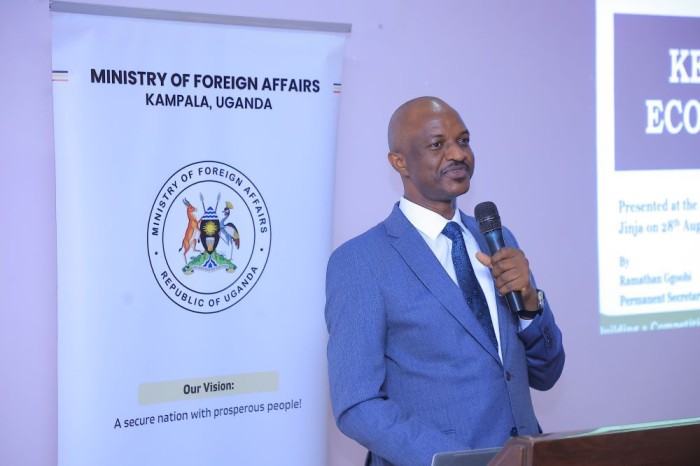The Permanent Secretary in the Ministry of Finance, Planning, and Economic Development, Mr. Ramathan Ggoobi, has urged Uganda’s ambassadors and heads of missions to take a leading role in advancing the country’s economic growth through innovative branding and marketing strategies.
Addressing a week-long retreat at the Civil Service College in Jinja, themed “Strengthening Governance and Performance of the Foreign Service for National Development,” Mr. Ggoobi emphasized the critical need for attracting tourists and investors as part of Uganda’s ambitious 10-fold growth strategy.
“Tourism is a low-hanging fruit that should be prioritized by ambassadors abroad,” Mr. Ggoobi stated, underlining the sector’s potential in driving economic expansion. He highlighted that Uganda aims to double its economy every five years in the medium term, despite ongoing global challenges.
Mr. Ggoobi presented an optimistic outlook on Uganda’s economic trajectory, noting that the country’s GDP growth rebounded to 6% in FY 2023/24 from 3% in FY 2019/20, owing to sound macroeconomic management, favorable weather, and an improving global economy.

Mr. Ramathan Ggoobi
Growth has been broad-based, Mr. Ggoobi observed, with significant expansions in all major sectors: Services grew by 6.6%, Industry by 5.8%, and Agriculture by 5.1% in FY 2023/24. He projected that GDP growth is expected to reach 6.4% in the current financial year, with potential to exceed 7% in the medium term. Under the 10-fold growth strategy, including the commencement of oil and gas production, GDP growth could surpass 10% in the initial years.
Mr. Ggoobi outlined the government’s action plan to achieve this ambitious growth, focusing on key sectors such as agro-industrial development, tourism, mineral exploitation, oil and gas, and advancements in science, technology, ICT, and innovation. He also discussed the financing mechanisms for this growth, including leveraging tax revenue, debt, market capitalization, and private sector credit. He called on ambassadors and heads of missions to work in unison to promote Uganda’s economic goals, stressing the importance of policy alignment, execution discipline, and the preservation of natural and human capital.
Addressing potential risks, Mr. Ggoobi acknowledged challenges such as corruption, inequality, climate change, global economic shocks, and resource conflicts. He proposed mitigative strategies including the promotion of inclusive policies, economic diversification, and deeper regional integration to safeguard Uganda’s growth prospects.
Complementing Mr. Ggoobi’s remarks, the Permanent Secretary in the Ministry of Foreign Affairs, Mr. Vincent Bagiire, highlighted the often understated but significant impact of the Ministry’s work. He cited successful initiatives like the construction of the Jinja Bridge, facilitated by the Uganda Embassy in Tokyo, and the development of an airport in Karamoja, initiated by the Uganda Embassy in Abu Dhabi. He also noted the establishment of a polytechnic institute in Uganda funded by Sharjah as another testament to the effective diplomatic efforts of Uganda’s foreign missions.
The Ambassadors’ Conference was inaugurated by Gen. Odongo Jeje Abubakhar, Minister of Foreign Affairs, who urged ambassadors and heads of missions to align their activities with Uganda’s National Development framework, including Vision 2040 and the Third National Development Plan. Gen. Odongo emphasized the importance of economic and commercial diplomacy as vital drivers of Uganda’s development, advocating for a focus on value addition, industrialization, and trade. The conference aims to enhance the performance and innovation of missions, promote peer-to-peer learning, and support regional and international peace and security initiatives.